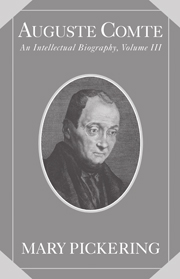Book contents
- Frontmatter
- Contents
- Acknowledgments
- Abbreviations and Notes
- Introduction
- 1 The Coup d'Etat and Its Consequences
- 2 Comte's Stumblings
- 3 The Vicissitudes of Positivism during the Early Empire
- 4 Système de politique positive: Natural and Social Philosophy
- 5 Système de politique positive: Comte's Philosophy of History
- 6 Système de politique positive: Comte's Utopia
- 7 The Last Years: Politics and Propaganda
- 8 The Last Flurry of Activity: The Testament and Synthèse subjective
- 9 The Death of the Great Priest of Humanity and His Influence
- Conclusion
- Bibliography
- Index
- References
2 - Comte's Stumblings
Published online by Cambridge University Press: 06 January 2010
- Frontmatter
- Contents
- Acknowledgments
- Abbreviations and Notes
- Introduction
- 1 The Coup d'Etat and Its Consequences
- 2 Comte's Stumblings
- 3 The Vicissitudes of Positivism during the Early Empire
- 4 Système de politique positive: Natural and Social Philosophy
- 5 Système de politique positive: Comte's Philosophy of History
- 6 Système de politique positive: Comte's Utopia
- 7 The Last Years: Politics and Propaganda
- 8 The Last Flurry of Activity: The Testament and Synthèse subjective
- 9 The Death of the Great Priest of Humanity and His Influence
- Conclusion
- Bibliography
- Index
- References
Summary
Although our religion is eminently feminine, it has remained up to now too unknown to the sex that will furnish its best support.
Comte to Richard Congreve, March 26, 1857SECOND THOUGHTS
As Louis Napoleon became more avid for power and the number of defections from the positivist movement grew, Comte changed his opinion about the usurper. He had originally thought that Louis Napoleon's regime would be short-lived, giving way to a positivist dictatorship. But as Laffitte pointed out, Comte's political predictions, particularly regarding the speed of events, were often wrong. After Louis Napoleon took over, many liberties were curtailed. Laws restricting freedom of the press were enacted in February 1852, and laws prohibiting gatherings of more than twenty people were promulgated in March. According to Comte, Louis Napoleon erred in claiming spiritual power, that is, control over people's intellectual and moral life. Comte worried that without freedom of the press and discussion, positivism could not demonstrate its philosophical superiority and its ability to solve the intellectual anarchy of the day, which to him was more important than the political disorder in causing the current Western malaise.
Moreover, Comte now recognized the dictator's imperial aspirations, which echoed his uncle's, and there was no public figure that Comte hated more than the first Napoleon. Louis Napoleon indeed hoped to overturn the settlement of the Congress of Vienna of 1815, which had undermined his uncle's achievements by curbing French expansionism. War was on the horizon.
- Type
- Chapter
- Information
- Auguste ComteAn Intellectual Biography, pp. 53 - 95Publisher: Cambridge University PressPrint publication year: 2009

